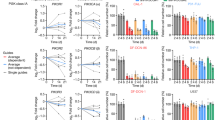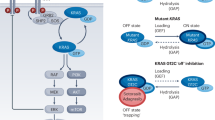Abstract
Multidrug resistance protein 4 (MRP4) is involved in the efflux of nucleoside derivatives and has a role in the determination of drug sensitivity. We investigated the relationship between MRP4 genetic polymorphisms and doses of the 6-mercaptopurine (6-MP) and methotrexate. Further, we evaluated the frequency of therapeutic interruption during maintenance therapy in Japanese children with acute lymphoblastic leukemia (ALL). Ninety-four patients received an initial 6-MP dose in the range of 30−50 mg m−2 in this analysis. Patients with homozygous variant allele in any of MRP4 G2269A, C912A and G559T required high frequency of 6-MP dose reduction compared with non-homozygous individuals. Average 6-MP dose for patients with homozygous variant allele on either MRP4 or inosine triphosphate pyrophosphatase was significantly lower than that for patients with non-homozygous variant allele during maintenance therapy (30.5 versus 40.0 mg m−2, P=0.024). Therefore, MRP4 genotyping may be useful for personalizing the therapeutic dose of 6-MP during the ALL maintenance therapy in Japanese.
This is a preview of subscription content, access via your institution
Access options
Subscribe to this journal
Receive 6 print issues and online access
$259.00 per year
only $43.17 per issue
Buy this article
- Purchase on Springer Link
- Instant access to full article PDF
Prices may be subject to local taxes which are calculated during checkout

Similar content being viewed by others
References
Relling MV, Hancock ML, Rivera GK, Sandlund JT, Ribeiro RC, Krynetski EY et al. Mercaptopurine therapy intolerance and heterozygosity at the thiopurine S-methyltransferase gene locus. J Natl Cancer Inst 1999; 91: 2001–2008.
Karas-Kuzelicki N, Jazbec J, Milek M, Mlinaric-Rascan I . Heterozygosity at the TPMT gene locus, augmented by mutated MTHFR gene, predisposes to 6-MP related toxicities in childhood ALL patients. Leukemia 2009; 23: 971–974.
Peregud-Pogorzelski J, Tetera-Rudnicka E, Kurzawski M, Brodkiewicz A, Adrianowska N, Mlynarski W et al. Thiopurine S-methyltransferase (TPMT) polymorphisms in children with acute lymphoblastic leukemia, and the need for reduction or cessation of 6-mercaptopurine doses during maintenance therapy: The Polish multicenter analysis. Pediatr Blood Cancer 2011; 57: 578–582.
Stocco G, Cheok MH, Crews KR, Dervieux T, French D, Pei D et al. Genetic polymorphism of inosine triphosphate pyrophosphatase is a determinant of mercaptopurine metabolism and toxicity during treatment for acute lymphoblastic leukemia. Clin Pharmacol Ther 2009; 85: 164–172.
Tanaka Y, Manabe A, Nakadate H, Kondoh K, Nakamura K, Koh K et al. The activity of the inosine triphosphate pyrophosphatase affects toxicity of 6-mercaptopurine during maintenance therapy for acute lymphoblastic leukemia in Japanese children. Leuk Res 2012; 36: 560–564.
Errasti-Murugarren E, Pastor-Anglada M . Drug transporter pharmacogenetics in nucleoside-based therapies. Pharmacogenomics 2010; 11: 809–841.
Ritter CA, Jedlitschky G, Meyer zu Schwabedissen H, Grube M, Kock K, Kroemer HK . Cellular export of drugs and signaling molecules by the ATP-binding cassette transporters MRP4 (ABCC4) and MRP5 (ABCC5). Drug Metab Rev 2005; 37: 253–278.
Kock K, Grube M, Jedlitschky G, Oevermann L, Siegmund W, Ritter CA et al. Expression of adenosine triphosphate-binding cassette (ABC) drug transporters in peripheral blood cells: relevance for physiology and pharmacotherapy. Clin Pharmacokinet 2007; 46: 449–470.
Lee K, Belinsky MG, Bell DW, Testa JR, Kruh GD . Isolation of MOAT-B, a widely expressed multidrug resistance-associated protein/canalicular multispecific organic anion transporter-related transporter. Cancer Res 1998; 58: 2741–2747.
Kool M, de Haas M, Scheffer GL, Scheper RJ, van Eijk MJ, Juijn JA et al. Analysis of expression of cMOAT (MRP2), MRP3, MRP4, and MRP5, homologues of the multidrug resistance-associated protein gene (MRP1), in human cancer cell lines. Cancer Res 1997; 57: 3537–3547.
Chen ZS, Lee K, Walther S, Raftogianis RB, Kuwano M, Zeng H et al. Analysis of methotrexate and folate transport by multidrug resistance protein 4 (ABCC4): MRP4 is a component of the methotrexate efflux system. Cancer Res 2002; 62: 3144–3150.
Krishnamurthy P, Schwab M, Takenaka K, Nachagari D, Morgan J, Leslie M et al. Transporter-mediated protection against thiopurine-induced hematopoietic toxicity. Cancer Res 2008; 68: 4983–4989.
Lee K, Klein-Szanto AJ, Kruh GD . Analysis of the MRP4 drug resistance profile in transfected NIH3T3 cells. J Natl Cancer Inst 2000; 92: 1934–1940.
National Center for Biotechnology Information. dbSNP.
Janke D, Mehralivand S, Strand D, Godtel-Armbrust U, Habermeier A, Gradhand U et al. 6-mercaptopurine and 9-(2-phosphonyl-methoxyethyl) adenine (PMEA) transport altered by two missense mutations in the drug transporter gene ABCC4. Hum Mutat 2008; 29: 659–669.
Abla N, Chinn LW, Nakamura T, Liu L, Huang CC, Johns SJ et al. The human multidrug resistance protein 4 (MRP4, ABCC4): functional analysis of a highly polymorphic gene. J Pharmacol Exp Ther 2008; 325: 859–868.
Gradhand U, Lang T, Schaeffeler E, Glaeser H, Tegude H, Klein K et al. Variability in human hepatic MRP4 expression: influence of cholestasis and genotype. Pharmacogenomics J 2008; 8: 42–52.
Manabe A, Ohara A, Hasegawa D, Koh K, Saito T, Kiyokawa N et al. Significance of the complete clearance of peripheral blasts after 7 days of prednisolone treatment in children with acute lymphoblastic leukemia: the Tokyo Children’s Cancer Study Group Study L99-15. Haematologica 2008; 93: 1155–1160.
Pozler O, Chladek J, Maly J, Hroch M, Dedek P, Beranek M et al. Steady-state of azathioprine during initiation treatment of pediatric inflammatory bowel disease. J Crohns Colitis 2010; 4: 623–628.
Chen ZS, Lee K, Kruh GD . Transport of cyclic nucleotides and estradiol 17-beta-D-glucuronide by multidrug resistance protein 4. Resistance to 6-mercaptopurine and 6-thioguanine. J Biol Chem 2001; 276: 33747–33754.
Peng XX, Shi Z, Damaraju VL, Huang XC, Kruh GD, Wu HC et al. Up-regulation of MRP4 and down-regulation of influx transporters in human leukemic cells with acquired resistance to 6-mercaptopurine. Leuk Res 2008; 32: 799–809.
Ansari M, Sauty G, Labuda M, Gagne V, Laverdiere C, Moghrabi A et al. Polymorphisms in multidrug resistance-associated protein gene 4 is associated with outcome in childhood acute lymphoblastic leukemia. Blood 2009; 114: 1383–1386.
Ban H, Andoh A, Imaeda H, Kobori A, Bamba S, Tsujikawa T et al. The multidrug-resistance protein 4 polymorphism is a new factor accounting for thiopurine sensitivity in Japanese patients with inflammatory bowel disease. J Gastroenterol 2010; 45: 1014–1021.
Lopez-Lopez E, Ballesteros J, Pinan MA, Sanchez de Toledo J, Garcia de Andoin N, Garcia-Miguel P et al. Polymorphisms in the methotrexate transport pathway: a new tool for MTX plasma level prediction in pediatric acute lymphoblastic leukemia. Pharmacogenet Genomics 2013; 23: 53–61.
van Aubel RA, Smeets PH, Peters JG, Bindels RJ, Russel FG . The MRP4/ABCC4 gene encodes a novel apical organic anion transporter in human kidney proximal tubules: putative efflux pump for urinary cAMP and cGMP. J Am Soc Nephrol 2002; 13: 595–603.
El-Sheikh AA, Greupink R, Wortelboer HM, van den Heuvel JJ, Schreurs M, Koenderink JB et al. Interaction of immunosuppressive drugs with human organic anion transporter (OAT) 1 and OAT3, and multidrug resistance-associated protein (MRP) 2 and MRP4. Transl Res 2013; 162: 398–409.
Adam de Beaumais T, Fakhoury M, Medard Y, Azougagh S, Zhang D, Yakouben K et al. Determinants of mercaptopurine toxicity in paediatric acute lymphoblastic leukemia maintenance therapy. Br J Clin Pharmacol 2011; 71: 575–584.
Acknowledgements
This study was supported by the Grant-in-Aid for Young Scientists (B) (22790170) and the Grant of National Center for Child Health and Development (25-2).
Author information
Authors and Affiliations
Corresponding author
Ethics declarations
Competing interests
The authors declare no conflict of interest.
Additional information
Supplementary Information accompanies the paper on the The Pharmacogenomics Journal website
Supplementary information
PowerPoint slides
Rights and permissions
About this article
Cite this article
Tanaka, Y., Manabe, A., Fukushima, H. et al. Multidrug resistance protein 4 (MRP4) polymorphisms impact the 6-mercaptopurine dose tolerance during maintenance therapy in Japanese childhood acute lymphoblastic leukemia. Pharmacogenomics J 15, 380–384 (2015). https://doi.org/10.1038/tpj.2014.74
Received:
Revised:
Accepted:
Published:
Issue Date:
DOI: https://doi.org/10.1038/tpj.2014.74
This article is cited by
-
Association of ITPA gene polymorphisms with adverse effects of AZA/6-MP administration: a systematic review and meta-analysis
The Pharmacogenomics Journal (2022)
-
Childhood acute lymphoblastic leukemia mercaptopurine intolerance is associated with NUDT15 variants
Pediatric Research (2021)
-
Somatic and germline genomics in paediatric acute lymphoblastic leukaemia
Nature Reviews Clinical Oncology (2019)
-
Interaction between NUDT15 and ABCC4 variants enhances intolerability of 6-mercaptopurine in Japanese patients with childhood acute lymphoblastic leukemia
The Pharmacogenomics Journal (2018)
-
ABCC4 functional SNP in the 3′ splice acceptor site of exon 8 (G912T) is associated with unfavorable clinical outcome in children with acute lymphoblastic leukemia
Cancer Chemotherapy and Pharmacology (2017)



